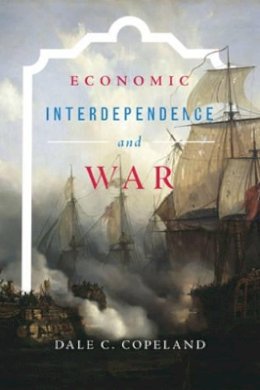
Stock image for illustration purposes only - book cover, edition or condition may vary.
Economic Interdependence and War
Dale C. Copeland
€ 48.88
FREE Delivery in Ireland
Description for Economic Interdependence and War
Paperback. Series: Princeton Studies in International History and Politics. Num Pages: 504 pages, 1 line illus. 7 tables. BIC Classification: JPA; JPS; KCL. Category: (P) Professional & Vocational; (U) Tertiary Education (US: College). Dimension: 235 x 167 x 25. Weight in Grams: 708.
Does growing economic interdependence among great powers increase or decrease the chance of conflict and war? Liberals argue that the benefits of trade give states an incentive to stay peaceful. Realists contend that trade compels states to struggle for vital raw materials and markets. Moving beyond the stale liberal-realist debate, Economic Interdependence and War lays out a dynamic theory of expectations that shows under what specific conditions interstate commerce will reduce or heighten the risk of conflict between nations. Taking a broad look at cases spanning two centuries, from the Napoleonic and Crimean wars to the more recent Cold War crises, Dale Copeland demonstrates that when leaders have positive expectations of the future trade environment, they want to remain at peace in order to secure the economic benefits that enhance long-term power. When, however, these expectations turn negative, leaders are likely to fear a loss of access to raw materials and markets, giving them more incentive to initiate crises to protect their commercial interests. The theory of trade expectations holds important implications for the understanding of Sino-American relations since 1985 and for the direction these relations will likely take over the next two decades. Economic Interdependence and War offers sweeping new insights into historical and contemporary global politics and the actual nature of democratic versus economic peace.
Product Details
Publisher
Princeton University Press
Format
Paperback
Publication date
2014
Series
Princeton Studies in International History and Politics
Condition
New
Number of Pages
504
Place of Publication
New Jersey, United States
ISBN
9780691161594
SKU
V9780691161594
Shipping Time
Usually ships in 15 to 20 working days
Ref
99-15
About Dale C. Copeland
Dale C. Copeland is an associate professor in the Department of Politics at the University of Virginia. He is the author of The Origins of Major War.
Reviews for Economic Interdependence and War
Winner of the 2017 ISA Annual Best Book Award, International Studies Association One of Choice's Outstanding Academic Titles for 2015 "This bold, well-written, and landmark work draws together the fields of international political economy and security studies. It also illuminates modern international history and the future."
Choice "[A] landmark book."
Foreign Affairs "[A] stimulating and penetrating book... A landmark contribution to the ongoing debate on the relationship between interdependence and peace."
Jack Snyder, International Security "Exhaustively researched... Copeland is a rarity among contemporary international relations scholars."
Erik Gartzke, Political Science Quarterly "Economic Interdependence and War is international relations on a gigantic scale. Copeland asks big questions, makes big arguments, engages big alternatives, and tests them all on big powers over a big time span... Books like this one are a healthy reminder that there remains trenchant things to say about the big picture... A work of passion, conviction, and erudition."
Joseph Parent, Perspective on Politics "This book provides a novel, nuanced and highly illuminating examination of the relationship between economic interdependence and war... The book's central arguments and findings will also be of clear interest and importance for current and future policy makers as they seek to grapple with the long-term effects of increasing economic interdependence."
Stephen Ellis, Political Studies Review "This landmark book makes bold arguments and parallel big achievements. On theoretical front, the book succeeds in presenting that as an amalgam of liberal and realist approaches, future trade expectation theory has a significant deductive and explanatory power. On empirical front, the book is one of the best case studies that go in depth based on the diplomatic-historical evidence among the existing large-N quantitative empirical studies."
Hakan Mehmetcik, Journal of Global Analysis
Choice "[A] landmark book."
Foreign Affairs "[A] stimulating and penetrating book... A landmark contribution to the ongoing debate on the relationship between interdependence and peace."
Jack Snyder, International Security "Exhaustively researched... Copeland is a rarity among contemporary international relations scholars."
Erik Gartzke, Political Science Quarterly "Economic Interdependence and War is international relations on a gigantic scale. Copeland asks big questions, makes big arguments, engages big alternatives, and tests them all on big powers over a big time span... Books like this one are a healthy reminder that there remains trenchant things to say about the big picture... A work of passion, conviction, and erudition."
Joseph Parent, Perspective on Politics "This book provides a novel, nuanced and highly illuminating examination of the relationship between economic interdependence and war... The book's central arguments and findings will also be of clear interest and importance for current and future policy makers as they seek to grapple with the long-term effects of increasing economic interdependence."
Stephen Ellis, Political Studies Review "This landmark book makes bold arguments and parallel big achievements. On theoretical front, the book succeeds in presenting that as an amalgam of liberal and realist approaches, future trade expectation theory has a significant deductive and explanatory power. On empirical front, the book is one of the best case studies that go in depth based on the diplomatic-historical evidence among the existing large-N quantitative empirical studies."
Hakan Mehmetcik, Journal of Global Analysis
